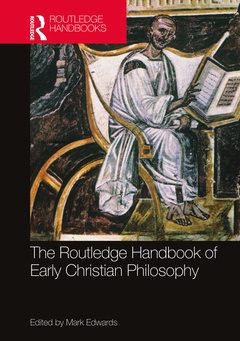The Routledge Handbook of Early Christian Philosophy
Coordonnateur : Edwards Mark

This volume offers the most comprehensive survey available of the philosophical background to the works of early Christian writers and the development of early Christian doctrine.
It examines how the same philosophical questions were approached by Christian and pagan thinkers; the philosophical element in Christian doctrines; the interaction of particular philosophies with Christian thought; and the constructive use of existing philosophies by all Christian thinkers of late antiquity. While most studies of ancient Christian writers and the development of early Christian doctrine make some reference to the philosophic background, this is often of an anecdotal character, and does not enable the reader to determine whether the likenesses are deep or superficial, or how pervasively one particular philosopher may have influenced Christian thought. This volume is designed to provide not only a body of facts more compendious than can be found elsewhere, but the contextual information which will enable readers to judge or clarify the statements that they encounter in works of more limited scope.
With contributions by an international group of experts in both philosophy and Christian thought, this is an invaluable resource for scholars of early Christianity, Late Antiquity and ancient philosophy alike.
1. Introduction Section 1: Themes 2. Sources of Divine Knowledge 3. Nature 4. Time and Eternity 5. Creation in Early Christianity 6. Providence and Evil 7. Logic and Religious Language 8. Ethics 9. The Mystical Element Section 2: Doctrines 10. The Trinity 11. The Philosophy of the Incarnation 12. The Philosophy of the Resurrection in Early Christianity 13. Biblical Hermeneutics Section 3. Schools 14. The Presocratics 15. Socrates and Plato 16. Aristotle and his School 17. Stoics and Christians 18. Epicureans 19. Cynics and Christians 20. Sceptics 21. Philo of Alexandria 22. Orpheus, Mithras, Hermes 23. Middle Platonists and Pythagoreans 24. Pagan and Christian Philosophy: Plotinus, Iamblichus and Christian Philosophical Practice 25. The Philosophy of the Later Neoplatonists: An Interaction with Christian Thought Section 4. Individuals 26. Justin and Athenagoras 27. Tatian, Theophilus and Irenaeus of Lyon 28. Clement of Alexandria 29. Tertullian and Cyprian 30. "Hippolytus" and Epiphanius of Salamis 31. Origen and Philosophy 32. The Sethians and the Gnostics of Plotinus 33. Arnobius and Lactantius 34. Philosophy in Eusebius and Marcellus 35. Arius and Athanasius 36. Marius Victorinus 37. Philosophy in Hilary of Poitiers and Ambrose of Milan 38. Eunomius of Cyzicus and Gregory of Nyssa 39. Didymus the Blind and Evagrius of Pontus 40. Synesius of Cyrene: Philosophy and Poetry "Sharing the same Temple" 41. Augustine of Hippo 42. Cyril of Alexandria 42. Theodoret of Cyrrhus 43. Boethius: The First Christian Philosopher in the Latin West? 44. John Philoponus 45. Dionysius the Areopagite 46. Christian Philosophynin Severus of Antioch and Leontius of Byzantium
Mark Edwards has been Tutor in Theology at Christ Church, Oxford, and University Lecturer/Associate Professor in Patristics in the Faculty of Theology and Religion in the University of Oxford since 1993. Since 2014, he has held the title of Professor of Early Christian Studies. His books include Origen against Plato (2002), Catholicity and Heresy in the Early Church (2009), Image, Word and God in the Early Christian Centuries (2012), Religions of the Constantinian Empire (2015), and Aristotle and Early Christian Thought (2019).
Date de parution : 01-2024
17.4x24.6 cm
Date de parution : 11-2020
17.4x24.6 cm
Thèmes de The Routledge Handbook of Early Christian Philosophy :
Mots-clés :
Young Man; Early Christianity; Early Christian Philosophy; Early Christian philosophers; NHC; Kephalaia Gnostica; Christianity and philosophy; Diogenes; Christianity and ancient Greek philosophy; Middle Platonism; Christianity and Hellenism; Nag Hammadi; Christianity and ancient Greek thought; Diogenes Laertius; Philosophy and Christian doctrine; Timeless; Philosophy and pagan thought; Chaldean Oracles; Theologians and philosophy; Marius Victorinus; Christianity and the Presocratics; Superimposed; Christianity and Platonism; Creation Of The World; Christianity and Aristotle; Confers; Christianity and the Peripatetics; Byzantium; Christianity and Cynicism; Theodicy; Christianity and Stoicism; Follow; Christianity and Epicureans; Spermatic Logos; Christianity and Stoics; Timaeus 29e; Christianity and Neoplatonism; Early Christian Thinkers; Christian philosophy; Plato’s Parmenides; Philosophical element; Sethian Gnostic; Antiquity; John Philoponus; Theaetetus 176b; God’s Logos



